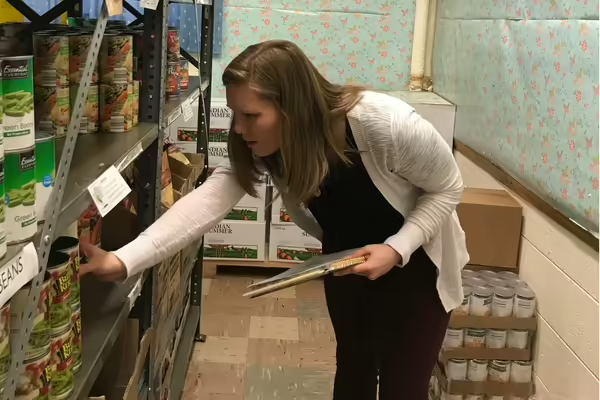
URBANA, Ill. – One in nine Illinois residents do not know where their next meal is coming from, including 15.7 percent of children. University of Illinois Extension helps fill in these gaps for Illinois families through programs on nutrition education, 4-H youth development, and horticulture.
Changing food pantry design to encourage healthy choices
Extension educators with Illinois Nutrition Education Programs (INEP) know that the making healthy choice is not always easy, especially for families on a budget. Both the Supplemental Nutrition Assistance Program Education (SNAP-Ed) and Expanded Food and Nutrition Education Program (EFNEP) provide hands-on, interactive nutrition education to limited-resource Illinois families to give them the knowledge and skills to make the healthy choice an easier choice.
SNAP-Ed also works with local agencies and coalitions to promote healthier environments and foods in Illinois communities. The program’s new Nutrition Environment Food Pantry Assessment Tool (NEFPAT) gives trained staff the ability to evaluate food pantry environments and recommend changes that will help families make healthier choices.
At the Collinsville Food Pantry in Collinsville, IL, these changes included highlighting a “recipe of the week” with foods bundled together to take home. Small shelf talker signage, placed on pantry shelves near corresponding foods, nudge families towards healthier choices. Director of Ministry Angelica Lipham says, “Seeing the clients read the posters and take the recipe cards has made a difference in our outgoing fresh produce … it’s going [home] with them!”
4-H members combat hunger close to home
Illinois 4-H members contribute to in a variety of ways to improving the food security of communities, including mobile food pantries, meal-packaging events, backpack food programs, free meals, and community gardens. “Illinois 4-H has provided more than 1 million meals to food pantries. In four years, 22,000 pounds of produce with a value of over $30,000 has helped feed hungry families,” said Bill Million, Illinois Extension 4-H youth development specialist. Volunteers provided nearly 3,000 hours of service to garden efforts.
In Washington County, 4-H youth help address food deserts through participation in a mobile food pantry program. Working with the Farm Bureau, BCMW Community Services, and Women, Infants, and Children (WIC) staff, 4-H members meet St. Louis Food Bank trucks, and sort and bag the food. As families arrive, 4-H hunger ambassadors distribute the bags. Any food remaining is distributed to county nursing homes, senior sites and family ministry sites. Last year, 70,000 pounds of food were distributed through pantries, serving 100 families each month.
Master Gardeners donate fresh from the garden
Extension Master Gardeners in Illinois support community donation gardens to increase fresh produce available for local residents, particularly low-resource populations. In 2017, Illinois Extension supported 79 food donation gardens throughout Illinois, with a median of 698 pounds of produce per garden donated last year. Recipients included food pantries, food banks, senior citizens centers, community social service agencies, local community and youth participants, and a children’s home.
One initiative combines garden support with nutrition education on how to use the fresh produce provided. The Growing Illinois Food Access program, part of a multi-state Growing Together program, partners Master Gardeners and SNAP-Ed educators in 16 project locations in Illinois this year. More than 250 volunteers at these project sites contribute time to expand food access in their communities through these partnerships. As one pantry participant said, “If the fresh food is available to us, we will eat healthier.”
Illinois Extension leads public outreach for University of Illinois by translating research into action plans that allow Illinois families, businesses, and community leaders to solve problems, make informed decisions, and adapt to changes and opportunities.